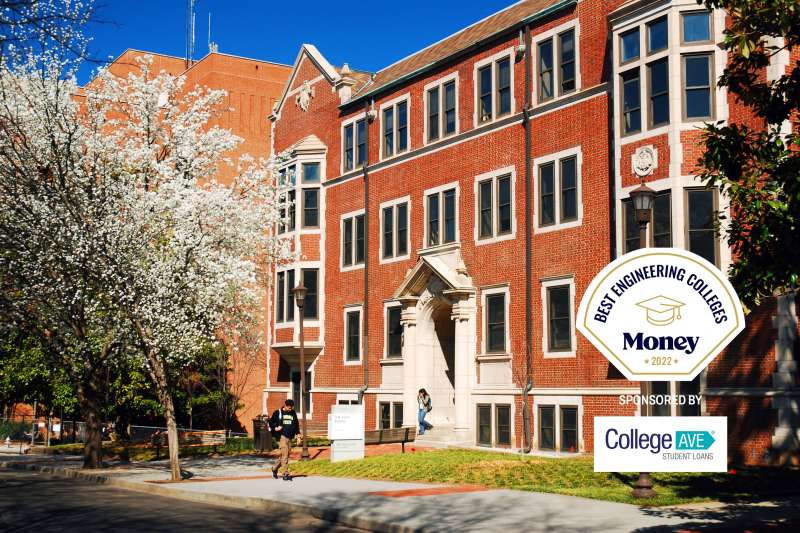Embarking on a journey into engineering education is a pivotal moment, and for those seeking an intimate and focused learning environment, small engineering colleges stand out as hidden gems. In this exploration, we delve into the seven best small engineering colleges, each distinguished for its unique offerings, close-knit communities, and commitment to nurturing the engineers of tomorrow. Here are the The 7 Best Small Engineering Colleges for Aspiring Engineers.
1. Greenfield Institute of Technology
Nestled among the picturesque landscapes, Greenfield Institute of Technology thrives as a beacon of personalized engineering education. With a student-to-faculty ratio of 10:1, Greenfield ensures that students benefit from individualized attention, fostering an environment where questions are encouraged, and ideas are cultivated. This size advantage contributes significantly to the creation of small class sizes, facilitating meaningful interactions between professors and students.
Distinctive Programs:
Greenfield prides itself on innovative engineering programs, with a particular emphasis on sustainable energy and environmental engineering. The curriculum is meticulously designed to blend theoretical knowledge with hands-on experiences, providing students with a well-rounded education that prepares them for real-world challenges. Students engage in cutting-edge research projects, exploring solutions to current environmental issues.
The institute’s commitment to sustainability extends beyond the curriculum. Greenfield’s campus serves as a living laboratory, implementing eco-friendly practices and renewable energy sources. This holistic approach ensures that students not only learn about sustainable engineering but also witness its practical applications.
2. Crestwood Engineering College
Crestwood Engineering College thrives on the principles of community and collaboration. With a commitment to maintaining a close-knit community, Crestwood creates an environment where students, faculty, and industry experts interact seamlessly. This familial atmosphere fosters mentorship opportunities, allowing students to benefit from the experience of their peers and industry professionals.
Cutting-Edge Facilities:
Despite its modest size, Crestwood invests significantly in state-of-the-art laboratories and research facilities. The college understands the importance of providing students with access to cutting-edge technologies. The engineering laboratories are equipped with the latest tools, ensuring that students gain hands-on experience with the same equipment they will encounter in their future careers.
Crestwood’s commitment to cutting-edge facilities extends to its dedication to keeping pace with technological advancements. The college regularly updates its infrastructure to align with industry standards, providing students with an education that remains relevant and competitive.
3. Summit Technical University
Innovative Research Opportunities:
Summit Technical University, though small, stands as a giant in terms of research prowess. The university actively involves students in groundbreaking research projects, creating an environment fueled by curiosity and innovation. The small size of the university facilitates close collaborations between faculty and students, allowing for a mentorship-driven research experience.
Career-Focused Programs:
Summit recognizes the evolving demands of the engineering industry. In response, the university offers specialized, career-focused programs. From robotics to artificial intelligence, students have the opportunity to tailor their education to align with their specific interests and future career aspirations.
Summit’s commitment to career-focused programs extends beyond the classroom. The university collaborates with industry partners to provide students with internship opportunities, ensuring that they gain practical experience in their chosen fields. These partnerships often lead to direct pathways from education to employment.
4. Harmony Engineering Institute
Harmony Engineering Institute stands as a testament to the belief that education extends beyond technical skills. The institute takes a holistic approach, emphasizing the development of soft skills, leadership qualities, and ethical considerations. Harmony understands that engineers of the future need to be well-rounded individuals capable of navigating complex ethical and social challenges.
Community Engagement
Beyond the boundaries of the campus, Harmony actively engages with the local community through outreach programs and collaborative projects. This community-oriented approach provides students with opportunities to apply their engineering knowledge to real-world scenarios, fostering a sense of responsibility and social awareness.
Harmony’s commitment to community engagement extends to global initiatives. The institute encourages students to participate in international projects, promoting cultural exchange and exposing them to diverse perspectives. This global outlook prepares graduates for careers in a world that is increasingly interconnected.
5. Pinnacle School of Engineering
Despite its small size, Pinnacle School of Engineering leverages its close connections with industry partners to provide students with a myriad of internship opportunities. The school recognizes the importance of practical experience in shaping well-rounded engineers and actively seeks partnerships that offer real-world exposure.
Global Perspective:
Pinnacle’s commitment to providing a global perspective is evident in its exchange programs and international collaborations. The school actively encourages students to participate in global initiatives, exposing them to diverse engineering practices and preparing them for a globally interconnected professional landscape.
Pinnacle’s approach to a global perspective goes beyond traditional classroom settings. The school facilitates collaborations with international engineering teams, allowing students to work on projects with real-world applications in various cultural and geographical contexts.
6. Aurora Engineering College
Aurora Engineering College recognizes that every student’s journey is unique. The college places a strong emphasis on individualized career guidance, ensuring that students receive personalized support in choosing specializations, internships, and career paths.
Alumni Network:
The strength of an institution often lies in the success of its graduates, and Aurora’s alumni network is a testament to the college’s impact. Graduates actively participate in mentoring current students, providing insights into industry trends, and facilitating networking opportunities.
Aurora’s commitment to a personalized approach extends to its alumni network. The college fosters strong relationships with its graduates, creating a supportive community that extends beyond graduation. This network becomes a valuable resource for students entering the engineering profession, offering guidance and mentorship.
7. Nexus Institute of Engineering
Entrepreneurial Focus:
Nexus Institute of Engineering stands out for its entrepreneurial focus. The institute actively encourages students to explore innovative ideas and provides resources for turning these ideas into viable projects or startups. Nexus understands that the ability to innovate and create is a crucial aspect of engineering education.
Industry-Integrated Learning:
Through partnerships with local industries, Nexus ensures that students are exposed to real-world challenges. Industry professionals often serve as guest lecturers, providing valuable insights and creating a bridge between academia and industry. This industry-integrated approach ensures that graduates are not only technically proficient but also well-versed in the practical applications of their knowledge.
Nexus’s commitment to industry-integrated learning extends to its focus on multidisciplinary projects. The institute actively encourages collaboration between engineering disciplines, mirroring the interdisciplinary nature of modern engineering projects.
Conclusion:
In conclusion, the best small engineering colleges offer an enriching educational experience characterized by close connections, innovative programs, and a strong focus on preparing students for the dynamic field of engineering. Aspiring engineers can find a wealth of opportunities in these smaller institutions that prioritize quality education and individual growth. From personalized attention and innovative research to global perspectives and entrepreneurial focus, these colleges pave the way for a new generation of engineers ready to tackle the challenges of the future.
READ ALSO: Get Paid to Move to Thailand

